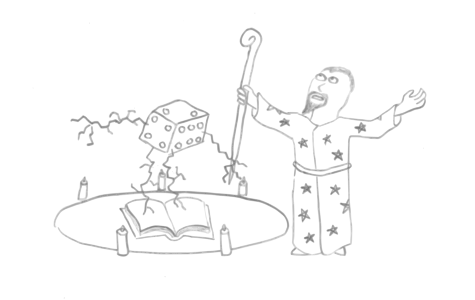In the indie tabletop RPG world there is a long tradition of design contests. From venerable institutions like Game Chef to one-off events like Threeforged these events have a strong cultural place in the Forge / StoryGames / post-Forge community. But a few questions tend to crop up again and again with regard to these events: Why don't more of these games get “finished”? And why don't they lead to tighter bonds of community among the participants? I am no stranger to these contests. As I chronicled in a previous post many of my RPG design projects got their start as contest games.
I have a hypothesis about why these activities don't have longer-term consequences. The basic idea is that a design contest is itself a game. Like all games it takes place inside a “magic circle”. It's this magic circle that gives people permission to act silly during a game of charades or to treat getting a ball through a hoop as something meaningful and important in a game of basketball. Or, in the context of an RPG design contest, it can help ease inhibitions for people who don't feel like “real designers” or to pursue ideas that don't seem like they're good enough to be “real games”, or feel free to try out mechanics that seem crazy. That part obviously works, as evidenced by the fact that so many people tend to participate in these contests, and a lot of people are able to complete something that works as a first draft of a game by the time the deadline rolls around.
But you cross the magic circle in two directions: getting in when the game starts and getting out when the game is over. Playing Pictionary doesn't lead to many artistic collaborations outside the game. Playing charades doesn't fill you win an urge to communicate silently when you go to work the next day. The games that are built with the emotional state established inside a design contest may not feel very important outside of it. Many of the contest games I mentioned in my earlier post match that pattern: I'm fine with them being “done” as nothing more than an entry in a design contest. Of the ones that don't fit that pattern, half were ideas that were floating in my head before the contests even started, the contests merely nudged me to actually get them down in tangible form. The other half came from the unusual Threeforged contest where I was developing a game idea based on some input from someone else, it wasn't just mine (and perhaps significantly, the entry I created for the first round of the contest tracks the same “I feel no urgency to work on it” pattern).
Obviously this isn't an iron law, some contest games do go on to become full, published games. And just like any game, it's possible to build bonds with the other players while participating, so even if my idea is 100% correct it would be wrong to say that design contests have no community effects. And this post shouldn't be interpreted as an argument against design contests, it's just an attempt to suggest a way to explain to the seemingly puzzling phenomenon that design contests don't seem to lead to more game designs or game designer community interactions outside of the contests even if it seems like you'd expect them to have that effect.

I feel like you're on to something here. I've observed the same pattern in video game design workshops and in hackathons, so I'll go one further and say that those things have "magic circles" as well. The biggest challenge in the hackathon community is how to make projects last beyond the hackathon. Likewise, games designed as part of courses or workshops (I've been a part of several, including at #hack4missions at Urbana 15 and as part of Video Game Studio at Northwestern) don't tend to make it off the ground - the ones that do are the rare exception. The person who answers the question of "how to take the hackathon home with you" will be heralded as a genius. So far, the only thing that seems to work is knowing the people you group up with before you get to the event, since that makes you stay in contact in a non-forced manner afterwards. For that reason, I always like to go to events with at least one person that I know - at a minimum, it gives me the chance to talk about the shared experience.